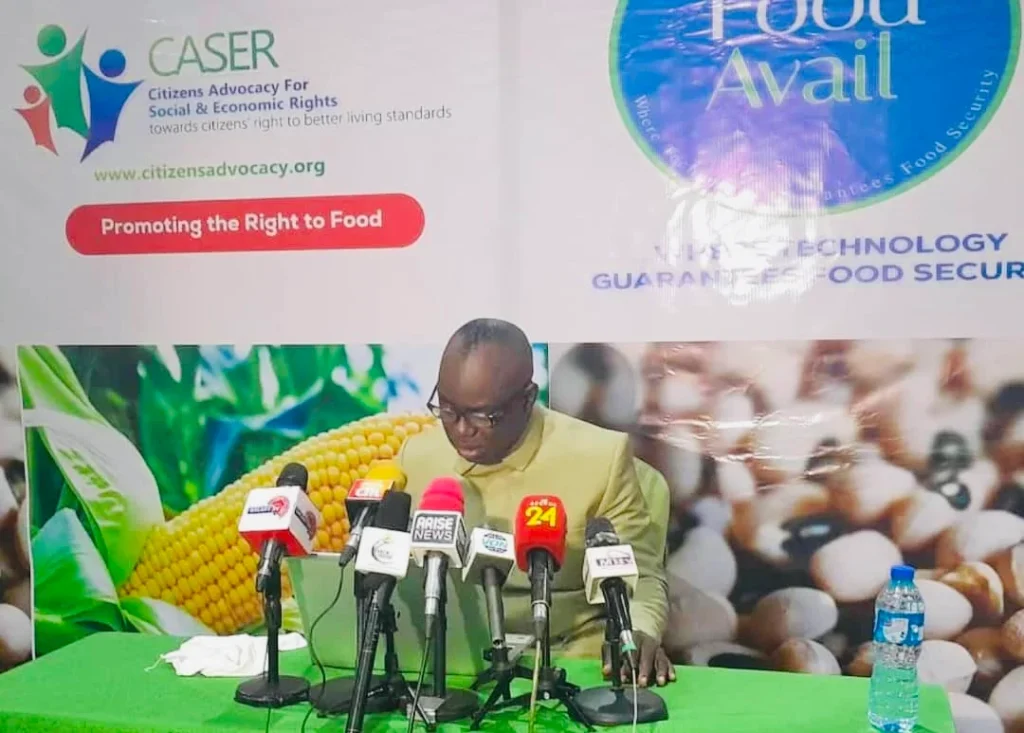Hadiza Ndadama
A non-governmental organization, Citizens Advocacy for Social & Economic Rights CASER has advocated for increased government funding for Genetically mortified (GMO) foods.The Executive Director of CASER, Barr. Frank Tietie while briefing journalists in Abuja Nigeria’s capital stressed on the importance of Genetically modified foods towards achieving the country’s food security.His briefing came at the backdrop of the claim by some stakeholders who have expressed concerns regarding the potential adverse effects of GMOs on the environment and public health, highlighting uncertainties that may exist.He urged the government and stakeholders to disregard concerns raised by detractors who advocate for the banning of GMOs and invest in the provision of GMO seeds to farmers.“We are worried by the ignorance displayed by some people, who lack knowledge about the advancements in biotechnology, as it dismisses the efforts and benefits of biotechnological advancement.”Barr Tietie emphasized that the cultivation of BT Cowpea and Tela Maize which are some major achievements of the Nigerian Scientists not only give the farmers bumper harvest but also eliminates the need for use of pesticides and insecticides since they are fortified to resist pests.He reminded stakeholders that Nigeria has been involved in research and development in biotechnology since 1987, recognising the potential benefits of the technology.“The Nigerian government, as far back as 1987, put legislation in place to encourage the application of biotechnology and genetic engineering as instrument of social economic development.
“In 1993 this same country established the Sheda Science and Technology Complex act. Section 5 of that act provides for an advanced laboratory for pure and applied research in Biotechnology and genetic engineering,” he added.He noted that Nigeria as far as those years already have intelligent people and the foresight to not leave the knowledge of Biotechnology for the rest of the world alone to explore but to also leave the legal framework to explore its benefits.He further recalled that in the year 2000, the American Congress enacted a law referred to as “The African growth and opportunities act” which removed import duties for over 1800 agricultural produce coming from Africa to the United States.“The United States Congress encouraged African countries to ensure that they developed agricultural products and particularly, cautioning and labelling requirements to allow consumers to make choices regarding Biotechnology products, and that there should be no discrimination against biotechnology products coming from Africa.”Barr Tietie further stated that the law was meant to last for 25 years but regrettably, Nigeria has not exploited the benefit of that law instead only oil was exported.He said that considering the great potentials and economic attraction for Biotechnology for national development, it became necessary to put together a regulatory framework and in 2015, Nigeria fully enacted the National Biosafety Management Agency Act to regulate the practice of genetic engineering.“That major milestone put Nigeria on a world map of ensuring safety in the application of modern biotechnology while harnessing its numerous benefits,’’ he said.Barr Tietie therefore called on the government, agricultural development stakeholders, and financial institutions to collaborate in providing genetically modified Tela maize and BT cowpea to farmers across the country.
